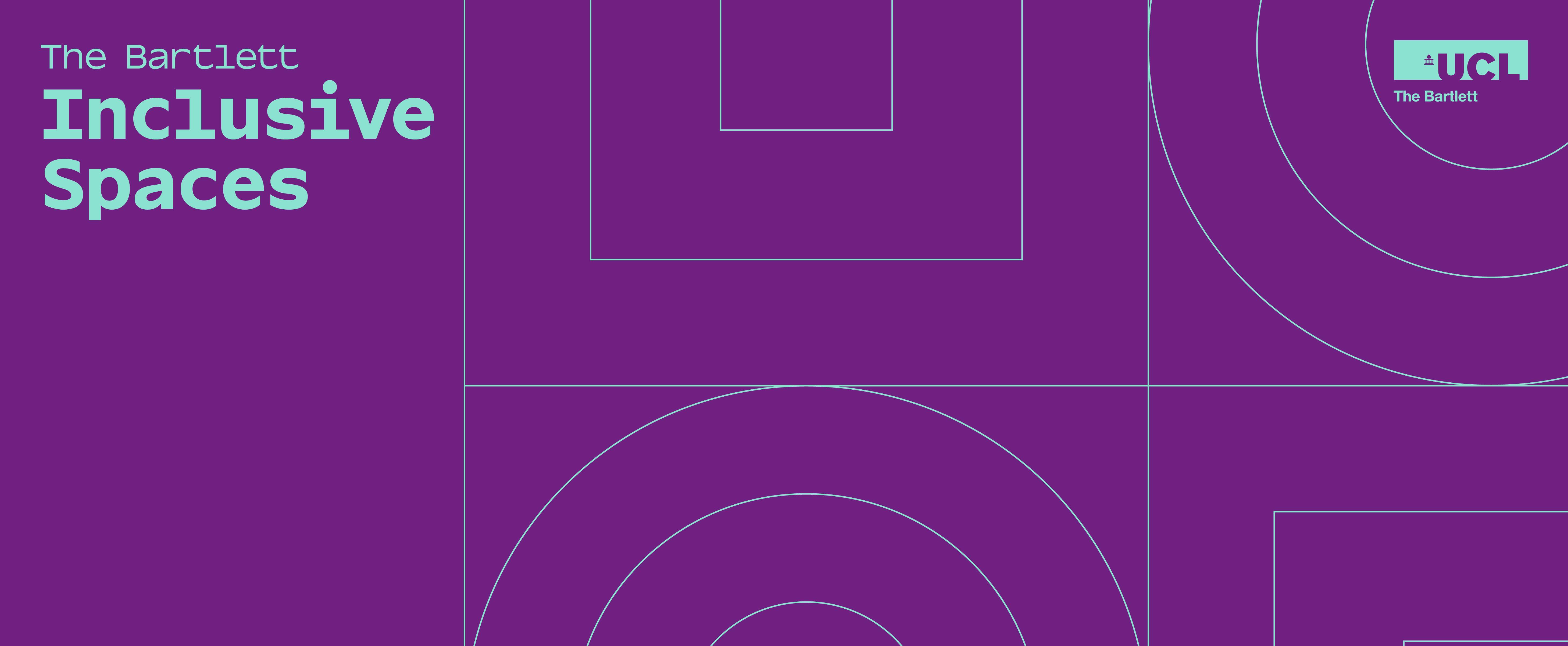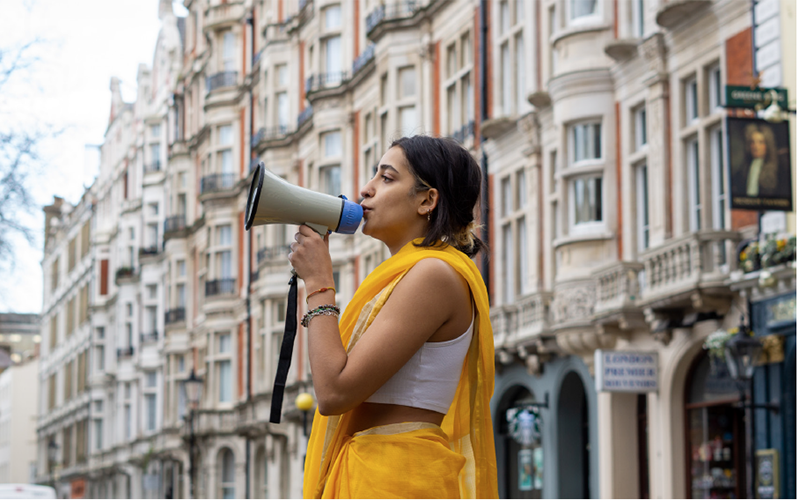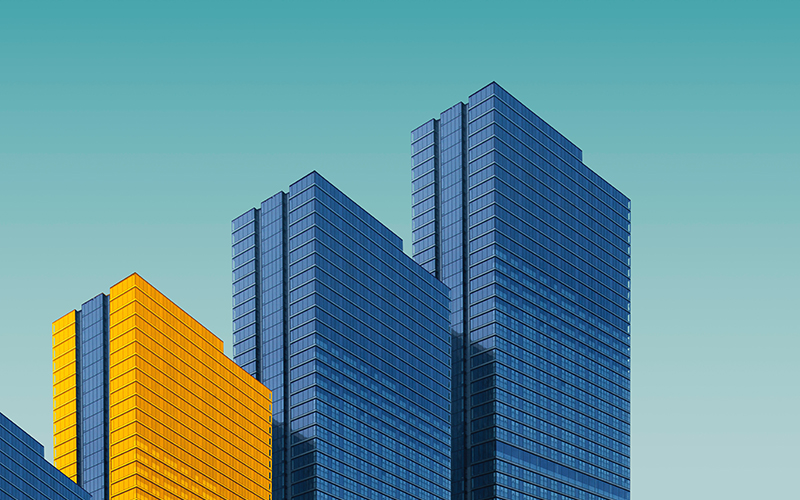Inclusive Spaces

In this bi-monthly event series, we inspired conversations about how we can think differently to create more equitable spaces, inclusive experiences and diverse cities and societies.
In each event, we delved into the latest ideas and research from The Bartlett’s leading thinkers in the built environment field. We explored disability, race, gender, LGBTQ+ and many other dimensions of diversity and discover how they intersect with built environments around the world.
Past events
- Decolonial and Restorative Policy
This online Inclusive Spaces event explored the importance of decolonial, intersectional, and other social justice frameworks in the rise of digital technology and artificial intelligence (AI), and explored restorative futures to champion change.
YouTube Widget Placeholderhttps://youtu.be/AIg3fU-UF58?si=YOpXl3O-KTrMi6PN - LGBTQIA+ Places and Stories
In this online event, the editors of ‘Queer Spaces’ explored the past and present life of LGBTQIA+ spaces from around the world – and their worthy place in history.
YouTube Widget Placeholderhttps://youtu.be/1osC270Ashk - Environments for Mental Health
This online Inclusive Spaces event explored the architecture of psychiatric buildings and the importance of involving end users in the design and planning of mental health care environments.
YouTube Widget Placeholderhttps://youtu.be/q30k-jMZAp4 - Deafening Architecture
This online Inclusive Spaces event explores the voices, experiences and designs of D/deaf creatives within architectural practice, pedagogy and research.
YouTube Widget Placeholderhttps://www.youtube.com/watch?v=8lpn3O6nlnQ - Trans Visibility and the City
This online Inclusive Spaces event explores trans people’s experiences of in/visibility in urban spaces and city life, and the contradictions that can make them simultaneously hyper-visible and hyper-vulnerable.
YouTube Widget Placeholderhttps://www.youtube.com/watch?v=A1bUzRTUG5E&feature=youtu.be inclusive_spaces_trans_visibility_and_the_city.docxinclusive_spaces_trans_visibility_and_the_city.docxinclusive_spaces_trans_visibility_and_the_city.docx- Housing Inequality and Heritage
In this interactive online discussion, we will explore the role that community engagement can play in addressing housing inequalities, and ask how communities can be better included in shaping and creating their own housing culture and heritage.
YouTube Widget Placeholderhttps://www.youtube.com/watch?v=Anl4LTfcCRo - Disability-Inclusive Design for Climate Resilient Cities
In this Inclusive Spaces session, our global experts share how the climate crisis is impacting disabled people, and what disability-inclusive and resilient solutions might look like.
YouTube Widget Placeholderhttps://www.youtube.com/watch?v=BXRsM1QBlIg - Religious Infrastructure in the City
In this thought-provoking discussion, we examine the interconnections between public spaces and personal faith and explore how Muslim and non-Muslim communities experience the creation of Muslim spaces.
YouTube Widget Placeholderhttps://www.youtube.com/watch?v=XYTwCrIky0g&ab_channel=TheBartlett%2CUCL... - Everyday Curriculums / Everyday Pedagogies
Explore how simple, everyday changes in built environment education can create more inclusive educational experiences, and show how simple, everyday tools can help educators diversify curricula and pedagogies.
YouTube Widget Placeholderhttps://www.youtube.com/watch?v=r0udUU9Imrs - Queering Public Space
In the last episode of Season 2 we explored the relationship between queer communities and public spaces and address the concept of ‘designing in diversity’.
The session was not recorded, but if you are interested in exploring the event’s theme further, you can read the Queering Public Space research report and watch the film produced by the speakers from Arup and the University of Westminster.
YouTube Widget Placeholderhttps://youtu.be/gbRUVSSARO4 - Mental Health and Social Justice in the Urban Outdoors
Explore insights into how park users derive wellbeing from greenspaces, the crucial role these can play for people’s mental health, and the lived experiences of disadvantaged and minority groups who have been disproportionately impacted by the pandemic.
Recording: Mental Health and Social Justice in the Urban Outdoors
YouTube Widget Placeholderhttps://www.youtube.com/watch?v=35GXjAapZN0 - CurrenSee - An inclusive attention economy
Explore data representation and the socio-economic inclusivity of non-human vantage points and volatile urban environments.
Recording: CurrenSee - An inclusive attention economy
YouTube Widget Placeholderhttps://youtu.be/yD8Dbk3COZg?t=278 - Exploring gender inequality in the built environment
Bartlett alumna Sherin Aminossehe walks us through her experience in the built environment and the changes that need to be made for gender equality.
Recording: Inclusive Spaces: Exploring gender inequality in the built environment
YouTube Widget Placeholderhttps://www.youtube.com/watch?v=IYxkUTKzjqo - Visibility, Inclusivity and Allyship in Built Environment Professions
In our latest Inclusive Spaces lecture, Dr Sam Chandan, Anna Coltrane, Adrian Silver, and Bartlett alum Tres Seippel explore the importance of being a built environment professional and visible members of the LGBTQIA+ community.
Recording: Inclusive Spaces Visibility, Inclusivity and Allyship in Built Environment Professions
YouTube Widget Placeholderhttps://www.youtube.com/watch?v=-YmTi0NPlPo&list=PLXfN7Y3ObDvpHlnTPR_6uu... - Decentralising solar economy
This Inclusive Spaces lecture explores insights on how civilization can be redefined in the face of our energy crisis, and the potential of solar energy development in compensating our modest urban capacities in renewable energy.
Recording: Inclusive Spaces Decentralising solar economy
YouTube Widget Placeholderhttps://www.youtube.com/watch?v=2fjb1dUt6jo - Crippling educational spaces
This panel discussion explores how we can critique the existing shape of higher education through the richness of our neuro and biodiversity differences, rather than ‘adding’ disabled people or merely including them into existing normative higher education practices.
Recording: Inclusive Spaces Crippling educational spaces
YouTube Widget Placeholderhttps://www.youtube.com/watch?v=3dzVJs9RqcQ&ab_channel=TheBartlett%2CUCL... - Accelerating Islamophobia and emerging ‘Mosquephobia’
In this talk, Professor Ali Alraouf discusses Islamophobia, and explains how it is related to inclusivity in the built environment, particularly in mosques. He explores how creativity in a mosque's design, alongside activities, openness, and its relation with the community and the urban context would lead to a better perception of Muslims and Islam.
Recording: Accelerating Islamophobia and emerging ‘Mosquephobia’
YouTube Widget Placeholderhttps://www.youtube.com/watch?v=CFqhk0CCAsU&list=PLXfN7Y3ObDvpHlnTPR_6uu... - Navigating Space Under Lockdown, the young BAME experience
This session examined the key findings of the Navigating Spaces Under Lockdown project, which documented the experiences of Black and racially minoritised young adults in England during the COVID-19 pandemic. Co-led by the Bartlett Development Planning Unit, The Ubele Initiative and FOAM20, and funded by The National Lottery Community Fund, this project explored how young people’s experiences of home, work, mobility, community, and well-being have been affected by the pandemic and by prolonged periods of lockdown.
Recording: Navigating space under lockdown, the young BAME experience
YouTube Widget Placeholderhttps://www.youtube.com/watch?v=lAPY-GtZB2Q - Participatory design and diversity
This event explored how the co-design of public spaces in areas affected by displacement and conflict can promote inclusivity and redress unequal power relations.
Recording: Participatory design and diversity
YouTube Widget Placeholderhttps://youtu.be/fdCHnsnEyQ0
- Queer perspectives: cross-cultural experiences in physical and online space
This event explored a variety of cross-cultural perspectives highlighting the physical and online experiences of queer people worldwide, and discussed the varied relationships that queer folk, especially QPOC (Queer People of Colour), have with the spaces they occupy, move through or are regulated by.
Recording: Queer perspectives: cross-cultural experiences in physical and online space
YouTube Widget Placeholderhttps://www.youtube.com/watch?v=10qN4u15DwE&ab_channel=TheBartlett%2CUCL... - Preventing ‘ruins of regeneration’ through youth-led co-design
This event explored the role youth-led design can have addressing the negative consequences regeneration has on young people in East London.
The panel showed how design thinking can be leveraged by young people in the local area to make regeneration work better for young East Londoners, and how their design as part of the Fuse project came from a consideration of what 'prosperity' means to young East Londoners and how it will support young people to thrive in the careers they want.
Recording: Preventing ‘ruins of regeneration’ through youth-led co-design
YouTube Widget Placeholderhttps://www.youtube.com/watch?v=rOTywc5fLLI&ab_channel=TheBartlett%2CUCL... - Why is cultural heritage under threat in London?
This event examines the nexus between ethnic minority spaces, London heritage policies (both local and city-wide), and the creative industries. It shares recent research findings on what is described as gentrification through 'hipsterfication', and its impact on ethnic minority spaces in London's East End – notably Brick Lane's Banglatown.
Parallels with other 'ethnic majority' are also be explored, in collaboration with the Just Space Network, an informal alliance of around 80 community groups, campaigns and concerned independent organisations acting as a voice for Londoners at grass-roots level.
Recording: Why is cultural heritage under threat in London?
YouTube Widget Placeholderhttps://www.youtube.com/watch?v=IhUZOUbQ74U - Rethinking disability and built space
This interactive workshop session will start from the work of disabled artists, designers, campaigners and scholars. We will discuss how engaging with disability at the intersections can be both a creative design generator, and a key means to challenge and change what is ‘normal’ in the design of the built environment.
In architecture and related fields in the built environment, disability as a concept – and disabled people – continue to be predominantly framed through a set of outdated and functionalist categories (wheelchair user, blind, deaf, etc.).
There is still a widespread assumption that ‘disability’ is unable to bring any kind of creativity to the design of human spaces.
Since 2008, the DisOrdinary Architecture Project has been challenging this assumption by promoting new practice for the built environment, led by the creativity and experiences of disabled artists.
By finding innovative and enjoyable ways of bringing together disabled creatives with built environment students, educators, researchers and practitioners, DisOrdinary Architecture is co-developing new forms of valuing, and designing with, the rich bio- and neurodiversity of our many different ways of being in the world.
Recording: Rethinking disability and built space
YouTube Widget Placeholderhttps://youtu.be/4DlPZ1VVIH0 transcript_-_inclusive_spaces_-_rethinking_disability_and_the_built_environment.docxtranscript_-_inclusive_spaces_-_rethinking_disability_and_the_built_environment.docxtranscript_-_inclusive_spaces_-_rethinking_disability_and_the_built_environment.docx
- Rethinking architecture to create social value
This session will be led by award-winning architect and Bartlett alumna Tumpa Husna Yasmin Fellows.
In part one, we’ll explore inclusive design methods, and answer key questions: How can architecture enable the voices of underrepresented communities to enable spatial justice? How can architects design for social value creation in places, buildings and neighbourhoods? How can designing inclusive spaces help us respond to the climate injustice? We’ll bring these issues to life with case study projects from the practise Our Building Design, which enabled marginalised local voices to be heard through community participation and evidence-based research, tackling complex social and environmental issues faced by the disadvantaged communities.
Part two will expose the urgent issue of diversity in the architecture profession. FAME collective is a research-based platform responding to a lack of understanding of how race and gender affect practitioners, young scholars and students in architecture and the built environment. We’ll explore how these professions need to diversify, in order to reflect the diversity of the local communities they are serving.
Recording: Re-thinking architecture to create social value
YouTube Widget Placeholderhttps://youtu.be/LviwOhvVHts
transcript_-_inclusive_spaces_-_levelling_the_playing_field.docxtranscript_-_inclusive_spaces_-_levelling_the_playing_field.docxtranscript_-_inclusive_spaces_-_levelling_the_playing_field.docx- Levelling the playing field
With over 30 million children forcibly displaced across the globe, can play spaces provide places of refuge, equity and inclusion?
Emergencies of forced displacement are prevalent across the globe, as of 2019, 40% of the 79 million people forced out of their homes were children. However, research often ignores the plight of urban refugee children who have limited access to resources and rights within the built environment.
Using Kitengela, a peri-urban town in Kenya as a case study, we’ll explore how play spaces can become significant places of safety, social integration and developmental progress.
Through the process of storytelling and digital mapping, we’ll look at the material and spatial characteristics which promote the naturally occurring play culture – while also foregrounding the issues that prevent both refugee Congolese children and host Kenyan children from accessing play in an inclusive, equitable manner.
This work has been developed by Marie Williams, based in the UCL Institute of Global Prosperity, through the process of co-design, in collaboration with local researchers and over 200 participants in 2020.
Recording: Levelling the playing field
YouTube Widget Placeholderhttps://youtu.be/cNhVa9jKn1U
 Close
Close



